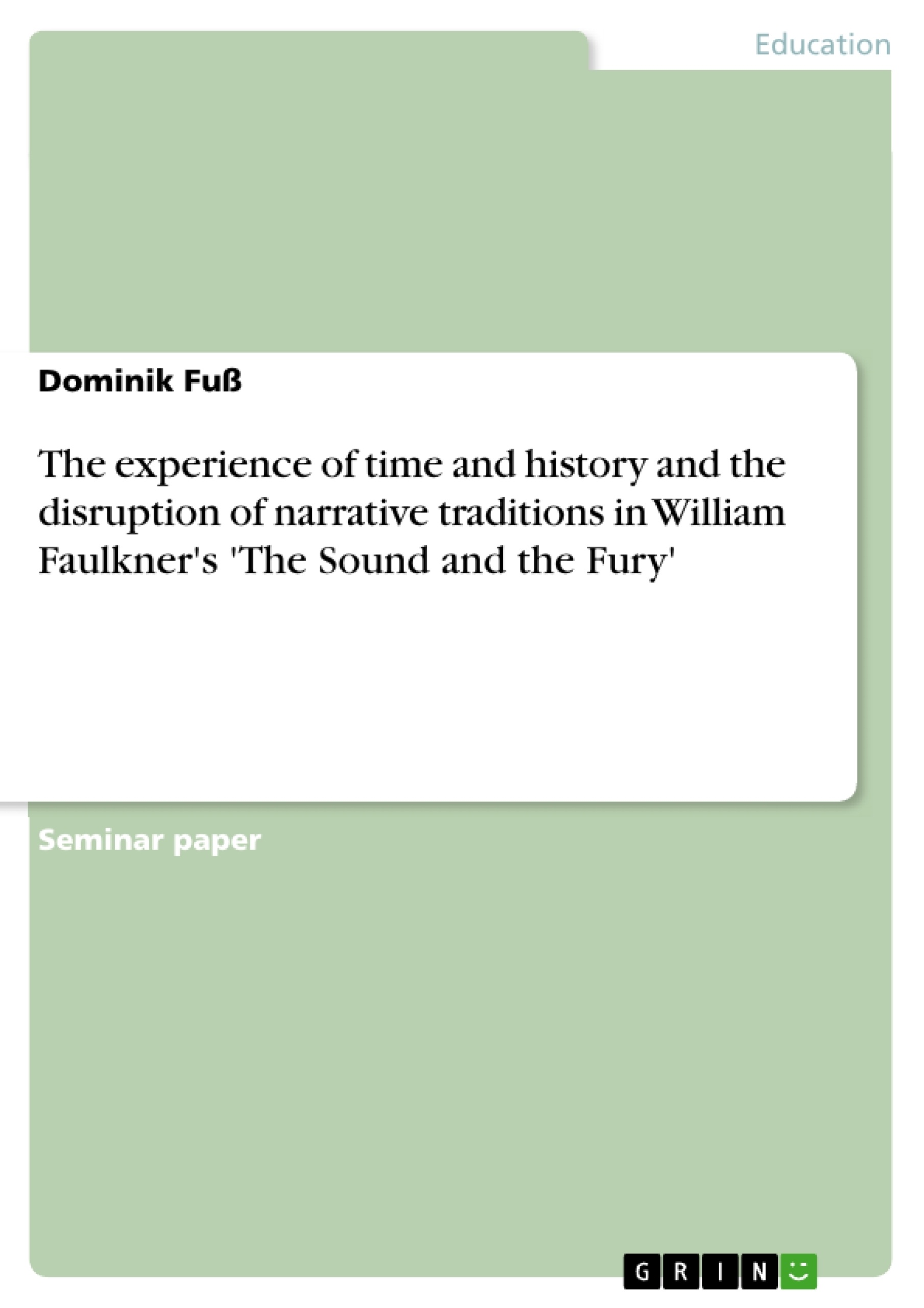The task of the present seminar paper is a threefold one though there may only be two primary elements discerned when one reads the topic first. The first one, “experience of time and history“, is solely concerned with The Sound and the Fury (intra-textual part) whereas the second one “the disruption of narrative traditions“ necessarily takes other works into account (inter-textual part). The former constitutes a close textual analysis of the two notions of “time“ and of “history“ as seen through the eyes of the major characters, it is therefore centred on content; the latter focuses on technical and stylistic questions and is correspondingly centred on form.
Nevertheless, the treatment of the first part must be divided in two since the terms “time“ and “history“ though they are similar in that they are both “diachroni-cal“ actually are quite different. Time in itself may be regarded as some sort of naked or unreflected history, a primary experience of the succession of events which has not been ordered and put together yet. History is the usually ordered and documented and thereby secondary portrayal of time by human societies; it is generally subdivided into - according to its relevance for society as a whole - social, political, national, regional, economic, religious history etc. or family and individual history. I will only focus on family and individual history here since other aspects are of lesser relevance in The Sound and the Fury .
One chapter is dedicated to each of the three elements of the topic, of which the first one - time - is the most important as it serves as basis for the compre-hension and approach of the two other parts.
Inhaltsverzeichnis (Table of Contents)
- Introduction
- Fateful time - conciliatory time: an analysis of four different time experiences
- Benjy's ignorance of time
- Quentin's obsession with time
- Jason's concept: “time is money”
- Dilsey's endure
- The decline of the Compson's: aspects of family and individual history
- Genealogy of the Compson's
- The past as burden, the present as impasse: reactions to a world broken up
- The Sound and the Fury as an experimental novel
- Traditional concepts of the novel and general readers' expectations
- Deviations and departures in The Sound and the Fury
- Conclusion
Zielsetzung und Themenschwerpunkte (Objectives and Key Themes)
This seminar paper examines the experience of time and history in William Faulkner's novel "The Sound and the Fury," analyzing how the novel disrupts traditional narrative conventions. The paper delves into the individual time experiences of the main characters, exploring the different ways they perceive and relate to time. It also explores the role of family and individual history in shaping the characters' destinies.
- The experience of time and history in “The Sound and the Fury”
- The disruption of traditional narrative conventions
- The different ways the main characters perceive and relate to time
- The impact of family and individual history on the characters
- The use of stream of consciousness as a narrative technique
Zusammenfassung der Kapitel (Chapter Summaries)
The first chapter analyzes the different time experiences of the four main characters. Benjy, a mentally challenged character, lives in a perpetual present, unable to distinguish between past, present, and future. Quentin, consumed by guilt and despair, obsessively dwells on the past, particularly his sister Caddy's downfall. Jason, driven by greed and cynicism, views time solely in terms of money and profit. Finally, Dilsey, the Compson's black servant, provides a counterpoint to the other characters' negative experiences with time, offering a sense of stability and endurance.
The second chapter explores the history of the Compson family, focusing on the decline of their social standing and the impact of the past on the present. The family's history serves as a burden, influencing the characters' choices and actions.
The third chapter examines how "The Sound and the Fury" deviates from traditional novelistic conventions. Faulkner employs stream of consciousness and unconventional narrative structures, challenging reader expectations and blurring the lines between reality and perception.
Schlüsselwörter (Keywords)
The main keywords and focus topics of this work are: time, history, family, individual, narrative, tradition, Faulkner, "The Sound and the Fury," stream of consciousness, Southern history, decline, Compson family.
Frequently Asked Questions
What are the two main elements of this seminar paper?
The paper focuses on the "experience of time and history" (intra-textual analysis) and the "disruption of narrative traditions" (inter-textual analysis) in Faulkner's work.
How does the character Benjy experience time?
Benjy lives in a state of ignorance regarding time, existing in a perpetual present where he cannot distinguish between past and current events.
What is Quentin Compson's relationship with time?
Quentin is characterized by an obsession with time, feeling burdened by the past and his family's decline, which eventually leads to his despair.
How does Faulkner disrupt traditional narrative conventions?
Faulkner employs experimental techniques like stream of consciousness and unconventional structures that challenge the reader's expectations of a linear story.
What is the difference between 'time' and 'history' in this context?
Time is viewed as a primary, unreflected succession of events, while history is the secondary, ordered portrayal of that time by individuals or societies.
Why is Dilsey an important character regarding the theme of time?
Unlike the Compson family members, Dilsey represents "conciliatory time" and endurance, providing stability amidst the family's disintegration.
- Quote paper
- Dominik Fuß (Author), 1997, The experience of time and history and the disruption of narrative traditions in William Faulkner's 'The Sound and the Fury', Munich, GRIN Verlag, https://www.grin.com/document/200639



